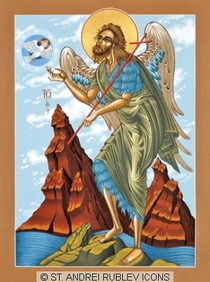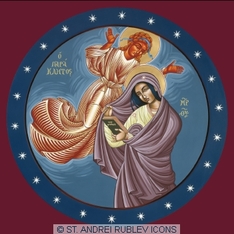 As we pray through the beginning of Advent there are all sorts of announcements in Scripture that can be the focus of our reflection. In the Gospel of Luke there is the announcement of the angel Gabriel to Mary. In the Gospel of Matthew the focus is on Joseph hearing from the same angel. In all four gospels we get the announcement of the coming of the Messiah from St. John the Baptist. All of them are announcing the Good News that the Messiah is coming soon. Each of these announcements varies in the mode in which it comes: it is loud and clear from John, who is a wild sort of man. The announcement to Joseph comes in a dream. The announcement to Mary comes with an amazing salutation and a gentle overshadowing. God is continually announcing things to us, and I would dare say that He does it in all of the modes mentioned: sometimes He tries to make it loud and clear and other times it comes with subtlety. Nonetheless, this is the time of year when we should be very open to these messages. In reflecting on the first week of Advent, the Old Testament prophets, such as Isaiah and Jeremiah, are obvious. They were telling the people who lived in their time to be ready. The Promised One of God, the Messiah, would indeed come. God never breaks a promise and so the prophets were assuring the faithful people that there would be a messiah coming soon. No one, not even the prophets, knew when "soon" was. They simply knew God would deliver on His promise. St. John the Baptist was the last of the prophets to point to the coming Messiah, but in his case, he could say the time was upon them. In other words, the Messiah had arrived and would be revealed soon. John is often referred to as the Forerunner of Christ because he spent his life pointing to the Messiah. We can learn a lot from John. Not only did he spend his ministry announcing the Messiah, but He lived his entire life for God alone. He never married and seems to have lived much of his life in the desert. John lived in a society that believed that everyone had to marry and have children. Children were seen as a blessing from God, but were also one's legacy. You passed your material goods to them and you also passed something of yourself on to them in a spiritual manner. Therefore in that culture, not to have children was the worst thing that could happen to a person. To choose not to have them was insanity! We know nothing of John’s life except that he was born of Zechariah and Elizabeth, a relative of Mary, the mother of Jesus. We know that he had some awareness of his calling early on, since his mother was made aware by the power of the Holy Spirit, and an angel delivered the message to an incredulous Zechariah, that their son was to be the Forerunner. He must have left their home when he was considered an adult to go to the desert to pray, discerning both his call as Forerunner and the message to be given at the appropriate time. He was indeed a man of prayer and reflection. He had to be. One does not embrace as radical a lifestyle as dressing in camel hair, eating wild locusts and honey, and living in the desert without a lot of prayer. It seems to me that he spent those hidden years getting to know God in order to know the message he was to deliver. The point is that John lived his entire life oriented toward God and this is something we are called to as disciples, no matter what lifestyle we live. John the Baptist not only delivered the message, but he did it with flair. He was not only to tell people to be ready, but that specifically they were to be baptized with water to cleanse them of sin. John announced a baptism of repentance, but was clear that the One to come would baptize with a more powerful baptism, with the Holy Spirit and fire. John was self-aware and humble. When the crowds came, he could have kept the "spotlight," but instead made it clear that he was not the Messiah; he was not worthy of untying His sandal straps. And true to form, when Jesus did show up John said, "He must increase and I must decrease." That is, he knew his job was done and that the Time of Promise had come. The Messiah was here. How do we let John the Baptist and his message have relevance during our first week of Advent? I think one thing we can reflect on is where we find spiritual preparation most meaningful. For me, it was in something I realized during Mass this past weekend. I recognized that we are experiencing a "little Advent" every week. When the Liturgy of the Eucharist begins, so also does the process of waiting for the Lord to become really present in the bread and wine. From the moment when the deacon begins to prepare the altar for the priest to pray over the bread and wine, we begin the process of waiting for the Lord to appear visibly before us. The priest then begins to pray over them, beginning with the blessing prayers and then the most important prayer of the consecration called the epiclesis. In the epiclesis, the priest invokes the Father to send the Holy Spirit down upon the elements of bread and wine that they may become the body and blood of the Son, Jesus Christ. Then he prays the words of institution; that is, he reminds us of what happened on the night Jesus died. Remember it is not a re-enactment: it is real. Jesus is then present with us, body and blood, soul and divinity, as the priest continues the prayer. He is indeed Immanuel: God-with-us! As in Advent, we have to wait! We know Jesus is present in His Body and Blood and yet we do not immediately receive Him! I think this is brilliant and most fitting. From the time He is really present on the altar, to the time we finally get to receive him at Communion we have time to reflect upon His presence and to speak with Him! We have time to welcome Him and to reflect upon His life and death. We have time to ask for forgiveness and to prepare ourselves for receiving Him. This sounds an awful lot like the point of Advent and the message of St. John the Baptist: Prepare, for He comes! He will make straight what is crooked, level what is too high, and build up what is lowly. He will smooth the rough places within us. He will enter our lives in a new way. He will offer us repentance and the graces that come with that, and He will give us new life. He will be born anew within us. Every week at Mass we have this mini-Advent. Maybe it can be the focus of your reflection as you go to Mass each day or each Sunday of Advent. Let the time of waiting for Him to be present in the Eucharist be pregnant with possibility and messages from Him. Maybe what was heard in the Scriptures and homily just moments earlier can be reflected upon. Maybe it is something else, but whatever it is, take the gift of that time of preparation and let your heart be made ready for His coming. Then when He is present after the consecration, continue to make yourself ready for His coming into your heart and soul when you receive Him at Communion. And maybe going to the sacrament of Reconciliation sometime during Advent is a good idea, too. We can take John's word that mercy and forgiveness is offered, but also that God wants to offer us grace through the Holy Spirit and the fire of His love. Let us pray that the message of St. John the Baptist comes alive in our hearts this Advent. Let us pray for openness to the preparation we need to make a place for the Lord to be born within us at Christmas. May we reflect upon His coming each Sunday that we can enter more fully into the mysteries celebrated at Mass! May we be like John, giving the message to others that He is coming anew through our deeds and even our words! And may we be open to letting God smooth the roughness within us, and to letting Him heal what needs healing! May we receive the graces of this first week of Advent! Let us meet in the heart of the Child of Promise, Jesus our Lord. Peace!  The icon on the top is St. John the Forerunner (The Baptist) written by Rev. William Hart McNichols. http://www.standreirublevicons.com/gallery.php?action=viewPicture&id=169 The icon to the left is The Mother of God Overshadowed by the Holy Spirit which was written by Rev. William Hart McNichols, also. It is one of my all time favorites of his work. This one is at http://www.standreirublevicons.com/gallery.php?action=viewPicture&id=192 If you are interested in purchasing a giclee print, plaque, or card of either of these you can do so at the links above, or you can see the entire website at http://www.standreirublevicons.com/
David
12/6/2012 04:02:10 am
Michele, Many thanks for this post and for the one on Advent Rising. In several ways, Advent is my favourite liturgical season. The Scripture readings are so filled with hope and there is something about the spreading light of the wreath; our wreath starts bare and we add pine cones and then berries as the season progresses. Also, in some way, the hyms remind me of lullabies sung by a mother to her infant as it slips into slumber.
elise campana
12/6/2012 04:35:49 am
Michelle, thank you for your insight on waiting for the Lord's coming Comments are closed.
|
Heart Speaks to Heart
|

 RSS Feed
RSS Feed

